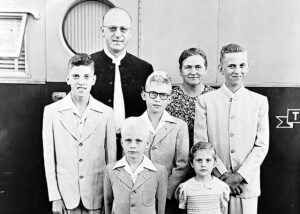“You will know the truth and the truth will make you free.”
Jesus’ oft-repeated axiom from John 8 lifts up the value of truth-telling. The living out of it, though, is not simple. As one poster riffed: “The truth will make you free, if it doesn’t kill you first.” In the accompanying picture, a two-dimensional figure with a worried face is being squeezed through the wringer of an old-fashioned washing machine. Yep, the truth can be freeing. It can be transforming. Or it can be as devastating as death.
How do we decide when to speak the truth, and when to leave a secret unspoken?
When something potent and negative has happened, is it better to shroud the event in silence or to weave it openly into the family narrative? When is it wise to leave the skeletons in the closet, and when is it most freeing to pull them out for a closer look? What makes for a healthy family?
Often it’s an emotionally loaded subject that creates the dilemma. I imagine you can think of examples from your own family or community. Was Mary really John’s daughter, or was someone else her father? Did Auntie die of natural causes or was it by her own hand? Did grandparents practise harsh “discipline” or would we now recognize it as abuse or violence? Was Uncle a child molester? Are there negative, demonic spiritual forces at work? Can they be exposed and brought into the light of truth?
Interestingly, in John 8, Jesus and his contemporaries named some of these hot topics, including adultery, illegitimacy, suicide, violence and murder. Death, demon-possession and lying itself are spoken of in this prolonged conflict between Jesus and those who wanted to trap him. Certainly we need to note differences in the context between Jesus’ situation and ours. Yet his invoking of the freeing power of the truth is relevant for us.
Generally speaking, I lean towards the truth. I begin by respecting the truth of my own witness, and what has been told to me. If Mary wonders about the identity of her father because of some information or insight she has, I hold that wondering with her. If people hint of suspicious circumstances around Auntie’s death, I listen carefully, and may ask gentle, clarifying questions as they search for truth. If anyone speaks to me of child abuse, I am compelled to take steps to protect vulnerable children, and to empower those most directly involved as they seek healing.
I lean towards the truth, because, as Jesus said, “The truth will make you free.” Secrets have an oppressive, constraining effect. Secrets inhibit family health and intimacy. They are similar to the closets in my house that are full of boxes with mysterious contents. In the closet, these boxes—secrets—remain packed up, trapping energy and hoarding their possible treasures. If a family can unpack a secret, they will likely open up new, deeper connections among the members. For example, if Auntie really did commit suicide, family members could tell the truth, and honestly grieve the deep pain of her struggle and death; offer each other true support and genuine comfort; and educate themselves about suicide in the event of others being similarly troubled.
There is much more to be said. For starters, though, let us lean towards the truth, and let us exercise care of the very young and the vulnerable. And please, if you have questions or comments, add them to the conversation.
Melissa Miller (familyties@mymts.net) has a passion for helping people develop healthy, vibrant relationships with God, self and others.
See Melissa’s other columns in the Healthy Families series:
Healthy families adapt
Healthy diversity
Healthy leadership







Leave a Reply
You must be logged in to post a comment.